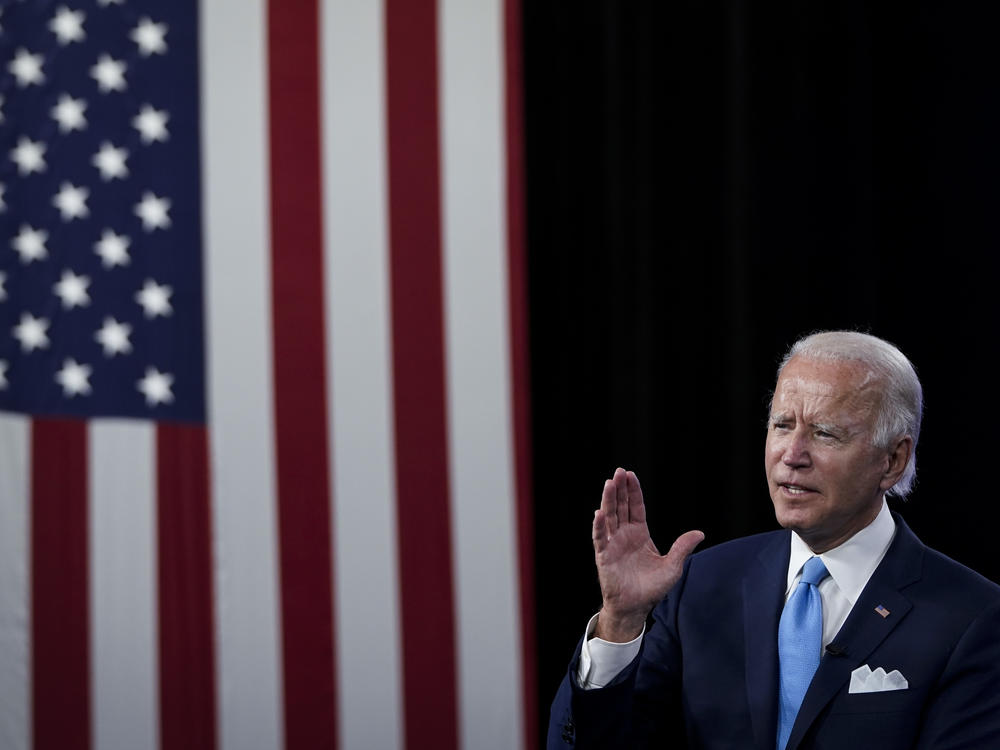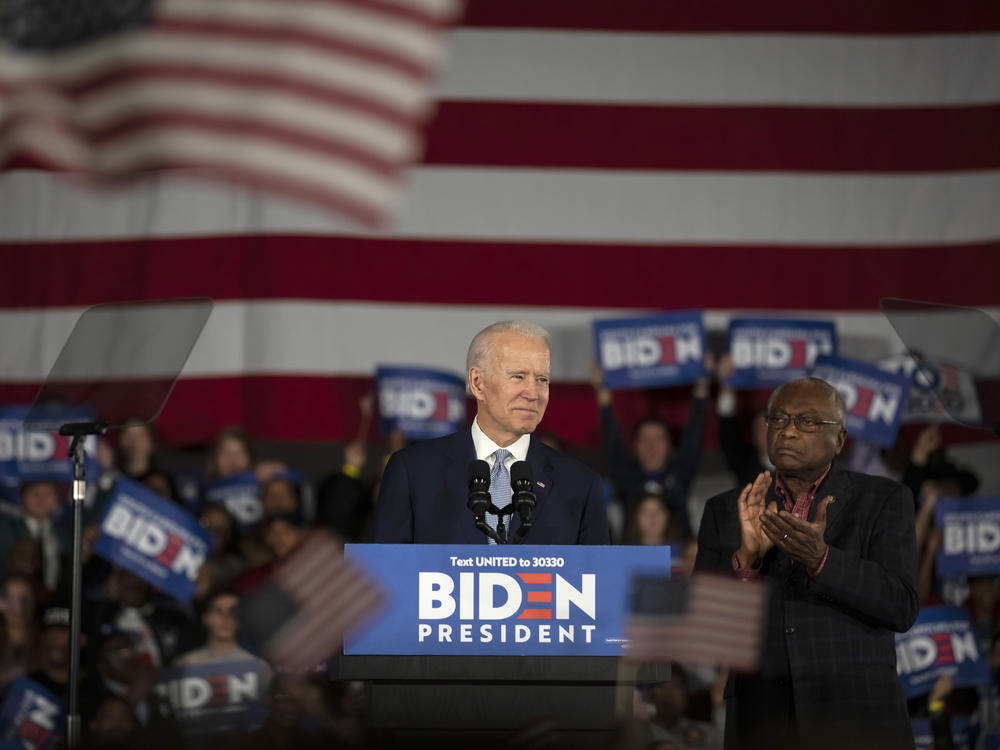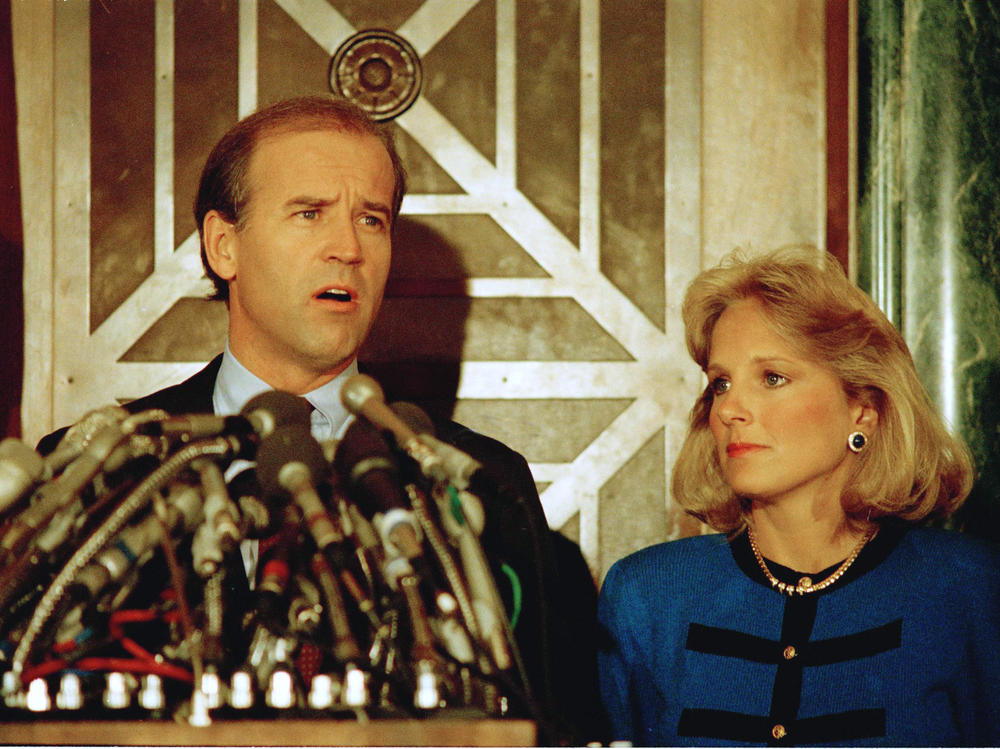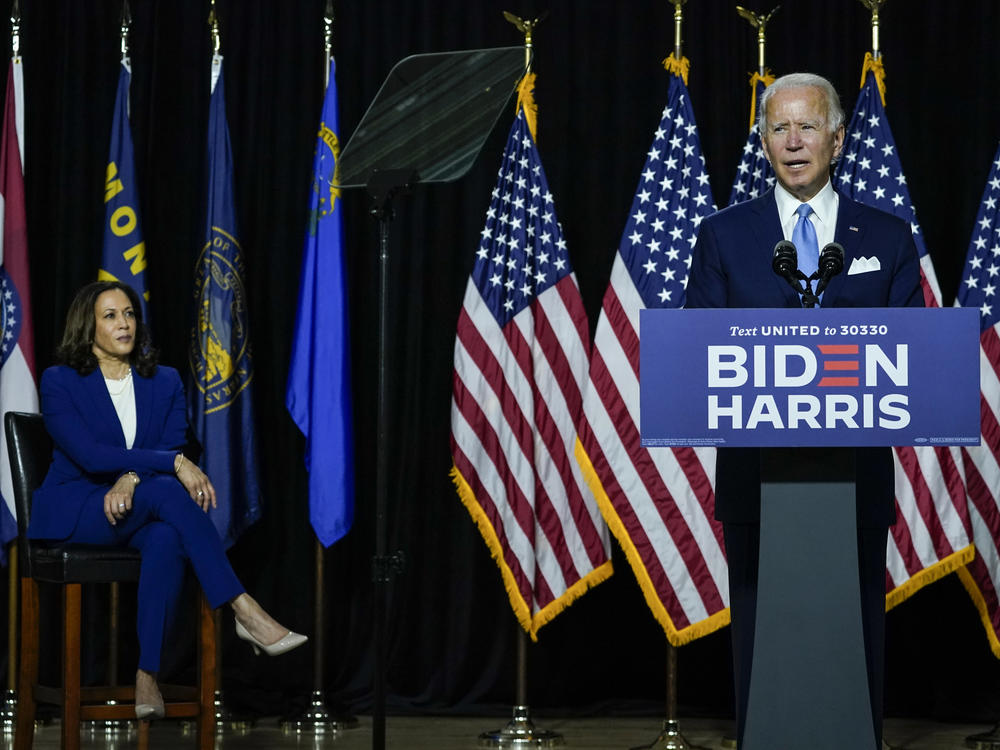Section Branding
Header Content
Joe Biden's Long And Rocky Road To The Democratic Nomination
Primary Content
When former Vice President Joseph Biden Jr. becomes the Democratic Party's official nominee for president on Thursday, he will complete two historic and improbable comebacks.
Earlier this year, Biden rose from roadkill status in early February voting to effectively claim the nomination by the end of March.
But 2020 was far from the first time Biden bid for the White House. His nomination realizes the dream of a recurrent campaign first launched more than three decades ago — in another political era, in another century. No other major party nominee has reached this plateau so many years after their first formal candidacy.
Most Americans know Biden as the No. 2 who served eight years under Barack Obama. They may know that Biden previously had been a high-profile, six-term senator from Delaware, chairman of the Senate Judiciary Committee and then the Foreign Relations Committee.
Fewer may recall that Biden was also a candidate for president in 2008, dropping out after finishing fifth in the Iowa caucuses. Fewer yet remember Biden's brilliant flame-out in 1987, when he was among the early favorites for the 1988 nomination. And few ever knew that Biden flirted with a campaign as far back as 1984 (when he actually received one delegate's vote at the national convention).
Biden was also mentioned as a potential candidate in more recent cycles, notably 2016. As Obama's vice president, Biden might well have been competitive with Hillary Clinton, the eventual nominee. He publicly considered a run in 2015, but stepped back after his son Beau died of cancer in May. He made his announcement in October, but several months later said he regretted not running "every day."
A rough start to 2020
What people do remember is that Biden began the current presidential cycle as the Democrats' putative front-runner, that he stumbled along the way and nearly washed out early. The Real Clear Politics average of polls showed him leading — but not dominating — the field throughout 2019. In a field that at one point teemed with more than 20 other hopefuls, Biden's polling rarely surpassed 30%.
He struggled at times in the debates, caught in the crossfire from rivals — including the one who is now his running mate, Sen. Kamala Harris of California. In the very first debate last year, her jab at Biden's stand on school busing in the 1970s ("That little girl was me") gave her fledgling campaign a bump. It also left a bitter taste with some of Biden's closest advisers that would hinder, but not prevent, her joining the ticket.
As the debates ground on and impeachment proceedings in Washington diverted media attention, Biden struggled to break away from the field. When his main challenger, Sen. Bernie Sanders of Vermont, had a heart attack in October, some Sanders backers gravitated to Sen. Elizabeth Warren of Massachusetts and other candidates, not Biden.
By the end of the Iowa caucuses on Feb. 3, Biden found himself an also-ran, just as in 2008. It was upstart candidate Pete Buttigieg, the former mayor of South Bend, Ind., who shared the winner's circle with Sanders. Biden finished fourth.
Sanders and Buttigieg again virtually tied in New Hampshire's primary on Feb. 11. Biden came in fifth, the choice of only one out of every 12 voters.
As Sanders and Buttigieg dueled for delegates, it was Sanders who got the biggest boost in the polls. His rise coincided with his big win in the Feb. 22 Nevada caucuses, where the avowed democratic socialist showed strong appeal among Hispanic voters and got nearly half the votes overall. Media reports were routinely referring to him as the front-runner.
But Biden stayed alive in Nevada, finishing second with 20%. It was enough to carry him to South Carolina and redemption.
Clyburn's crucial contribution
South Carolina's first-in-the-South primary matters in the Democratic contest because it is the first event where African American voters — with whom Biden had residual appeal as Obama's vice president — carry outsize influence. As attention turned to the Palmetto State, its senior officeholder, James Clyburn, the highest ranking Black member of Congress as the House majority whip, announced his endorsement of Biden.
Clyburn's backing all but guaranteed Biden would carry the Black vote. But it did more than that — it created the first real groundswell of energy for his campaign in months. That weekend, Biden won the Black vote overwhelmingly, especially among women, fueling a blowout that saw his vote share and Sanders' reversed from the Nevada tally. In the biggest event of the year to date, Biden got nearly half the vote and Sanders a fifth. No other candidate got enough to earn a delegate.
With Super Tuesday looming, both Buttigieg and Minnesota Sen. Amy Klobuchar dropped out and endorsed Biden. They said he was the candidate most likely to beat President Trump, which was the criterion most often cited as crucial by Democratic voters. Warren remained in the hunt, but barely, giving Biden the one-on-one match with Sanders he had been wanting.
After Nevada, Sanders had been poised to win most of the 14 states voting in the March 3rd Super Tuesday contests. But South Carolina shifted the momentum. Sanders won in California, Colorado, Utah and his home state of Vermont. Biden swept the rest, including Texas and five other Southern states where he won at least 55% of votes among African Americans.
The shift in momentum dimmed Sanders' hopes for recovery in states where he had done well in 2016 — such as Missouri, Michigan and Washington. After Wisconsin joined that list on April 7, Sanders dropped out. Within a week, he endorsed Biden.
In the four months since, as other states have held their nominating events, Biden has continued to reap the delegate harvest essentially unopposed. While the coronavirus has limited his "campaigning" to remote events and interviews from his home in Wilmington, Del., Biden his gradually risen in the polls and built a lead over the incumbent president that stood at 11 points in the latest NPR/PBS NewsHour/Marist poll released Friday.
That trend has continued despite Biden's relative inactivity, driven less by the Democrat than by Trump's controversies, especially his handling of the virus, the economic fallout and the widespread racial unrest that followed the killing of George Floyd by police in Minneapolis.
The longer comeback
February was not the first time Biden's presidential prospects seemed lost. Twice before he had been regarded as a promising contestant who faltered not far from the starting gate.
In 1987, Biden was among several Democrats visiting Iowa and New Hampshire as the clock wound down on President Ronald Reagan's second term. Biden was then 45 and in his third term in the Senate, having first been elected in 1972 when not yet 30 years old on Election Day. He was known for his extroverted personality and aggressive speaking style, and he traveled to Democratic dinners around the country giving a carefully crafted speech reminiscent of John and Bobby Kennedy.
In the spring of that year, Biden was competitive in polls of the Democratic hopefuls, along with Sen. Al Gore of Tennessee and Gov. Michael Dukakis of Massachusetts (the eventual nominee). Biden was regarded as a threat by the cycle's early front-runner, former Sen. Gary Hart of Colorado. But Hart's campaign collapsed in May after The Miami Herald reported he had entertained a young woman at his Washington townhouse while his wife was in Colorado.
Hart's fall seemed to benefit Biden, but soon thereafter reporters received copies of a videotape of Biden giving a speech that borrowed from one given by a British politician. This revived accounts of an accusation of plagiarism while Biden was in law school. At an event in New Hampshire, Biden angrily denounced a man who questioned him. It happened long before the internet and social media, but the footage was widely shared on news programs. Biden suspended his campaign.
The following year he suffered a pair of life-threatening brain aneurysms that led to two surgeries and kept him from the Senate for weeks.
Having left the campaign trail, Biden focused on the Judiciary Committee, where he oversaw the highly contentious confirmation hearings of Supreme Court nominees Robert Bork (rejected in 1987) and Clarence Thomas (confirmed in 1991). Like most of his ambitious colleagues in the Senate, Biden saw no chance of beating President George H.W. Bush in 1992 and did not enter the primaries that year.
In 2000, the Democratic nomination was all but conceded to Gore, who by then was serving as vice president. In 2004, several prominent Democrats sought the nomination against President George W. Bush, but not Biden. Late in Bush's second term, however, Biden joined the squad of senators — including Obama and Hillary Clinton — in a series of debates that began early in 2007.
Biden did well in these meetings, but also occasionally displayed his proclivity for gaffes. On one occasion he referred to Obama as the first presidential candidate who was a "mainstream African-American who is articulate and bright and clean and a nice-looking guy." Not long after that remark, Biden flopped in the Iowa caucuses that kicked off the voting in January 2008.
What has changed?
How did Biden come back over time to bestride the party with such stature at this moment? Has Biden changed or have the Democrats changed, or is this a different country today?
In varying degrees, all three have changed. Often seen as garrulous and talkative in his Senate years, Biden has been more subdued in public during the current cycle. He has also seemed sobered by the pandemic and by the portents he sees in the governing mode of President Trump. That matured persona has played well in the current climate, at least among Democrats, large majorities of whom view the COVID-19 crisis as a major concern and share a sense of anxiety and dread about Trump.
The Democratic Party today is younger and less Caucasian than it was when Biden first contemplated a run for president. Biden will be the oldest nominee either party has ever had, and would be the oldest occupant of the White House ever on the day he took the oath. But the younger voters who preferred Sanders did not turn out in significant numbers during the primaries, a fact Sanders himself acknowledged.
And while Biden would seem miscast as the champion of people of color, he wound up benefiting most from their votes, which never coalesced around Harris, or Sen. Cory Booker of New Jersey or Julian Castro of Texas — all of whom dropped out before Iowa.
This is also a more progressive Democratic Party, as shown by the success of Sanders' two campaigns and the popularity of Warren's stands in 2020. Ideologically, Biden has been generally moderate to center-left, and while he has moved toward Sanders and Warren on health care and other issues since becoming the presumptive nominee, big differences remain.
In the end, Biden had just enough connection, whether through his often-mentioned association with Obama or his ties to officeholders and other party influencers, to overcome his deficits.
And as the nation's oldest political party gathers in virtual space for its 2020 convention, it is less a celebration of Biden, or Biden-Harris, than it is a concentration of opposition to the incumbent president. If the Obama-Biden ticket saw itself as groundbreaking, the Biden-Harris campaign will cast itself more as a rescue mission.
Copyright 2020 NPR. To see more, visit https://www.npr.org.




